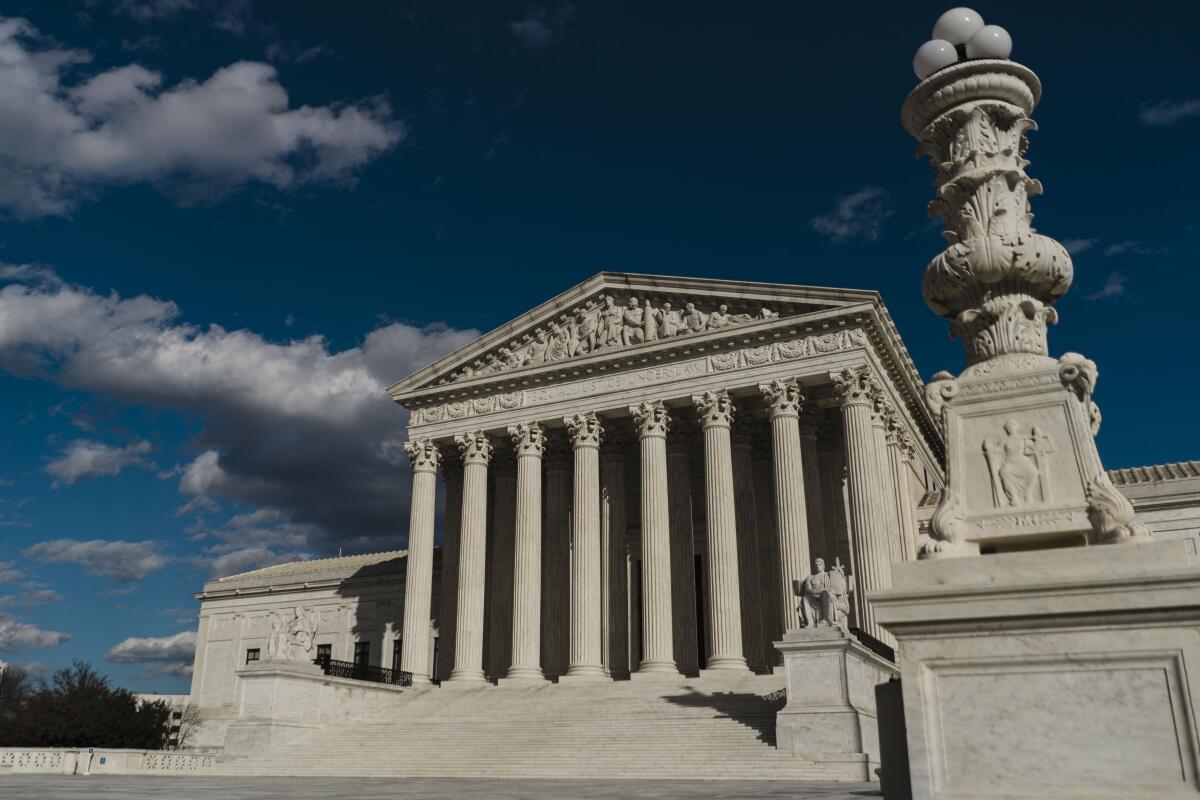Supreme Court warns unions against strikes that damage an employer’s property

- Share via
WASHINGTON — The Supreme Court warned unions on Thursday that they may face suits for damages if striking workers destroy their employer’s property.
In an 8-1 decision, the justices revived a suit brought in Washington state against the Teamsters Union whose drivers allegedly walked off the job one morning after their trucks had been loaded with fresh concrete. The drivers did not notify their employer in advance. If left unattended, concrete can harden and destroy the trucks that carry it, said Glacier Northwest, the concrete company.
At issue was whether the union may be sued for allegedly damaging the property or whether such a labor dispute must be reviewed and resolved first by the National Labor Relations Board.
With only Justice Ketanji Brown Jackson in dissent, the court ruled the company may press its suit for damages in a state court.
Some union advocates said they feared a decision for the company in Glacier Northwest vs. Teamsters could undercut the right to strike. Jackson, in her strongest dissent to date, said the law does not treat workers as “indentured servants, bound to continue laboring until any planned work stoppage would be as painless as possible for their master.”
But Justice Amy Coney Barrett, writing for the court, said the labor law has long required striking workers to take “reasonable precautions to protect their employer’s property” from damages “due to the sudden cessation of work.”
“All agree that the National Labor Relations Act protects the right to strike but that this right is not absolute,” she said.
While unions may inflict an economic injury on a company by striking, they are not free to inflict damage on its property, the ruling said.
“In this instance, the Union’s choice to call a strike after its drivers had loaded a large amount of wet concrete into Glacier’s delivery trucks strongly suggests that it failed to take reasonable precautions to avoid foreseeable, aggravated, and imminent harm to Glacier’s property,” she said.
Her opinion sends the case back to a state court in the Seattle area. A trial judge and the state Supreme Court had dismissed the company’s claim on the grounds that it was preempted or trumped by federal labor law.
Chief Justice John G. Roberts Jr. and Justices Sonia Sotomayor, Elena Kagan and Brett M. Kavanaugh joined Barrett’s opinion.
Justices Clarence Thomas, Samuel A. Alito Jr. and Neil M. Gorsuch concurred in the outcome but would have gone further to limit the authority of the NLRB.
“Today’s misguided foray underscores the wisdom of Congress’s decision to create an agency that is uniquely positioned to evaluate the facts and apply the law in cases such as this one,” Jackson wrote in her 27-page dissent.
Jackson said the company in this case sought to “shift the duty of protecting [its] property from damage or loss incident to a strike onto the striking workers...In my view, doing that places a significant burden on the employees’ exercise of their statutory right to strike, unjustifiably undermining Congress’s intent.”
AFL-CIO President Liz Shuler issued a statement that downplayed the ruling. She said the court had “relied on unfounded allegations” by the company to revive its lawsuit.
“But when the facts are revealed on remand, it will be clear the union acted properly and the truck drivers’ strike was protected by federal law,” Shuler said. “This decision will in no way deter workers from going on strike.”
The National Right to Work Foundation, which supported the company, said the high court had “correctly ruled that union officials should not be granted immunity from state lawsuits over deliberate property damage perpetrated during union strike actions.”
Mark Mix, the group’s president, said the “case shows how far courts and lawmakers have to go in order to level the playing field and stop allowing union bosses to play by a different set of rules from those that apply to all other citizens and private entities.”
More to Read
Get the L.A. Times Politics newsletter
Deeply reported insights into legislation, politics and policy from Sacramento, Washington and beyond. In your inbox three times per week.
You may occasionally receive promotional content from the Los Angeles Times.











